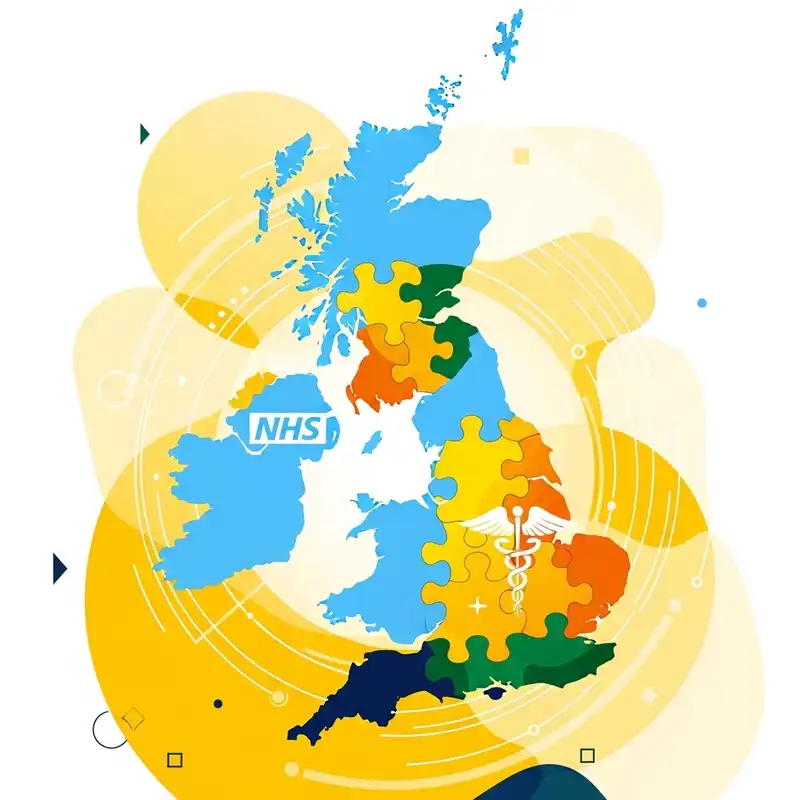Beyond the Grind: How Proactive Protection Unlocks Your Full Life Potential in an Uncertain World

As health data projects 1 in 2 people in the UK will face a cancer diagnosis by 2025, discover how proactive personal protection transforms anxiety into unshakeable growth, empowering your life, relationships, and future development. Learn how strategic choices like Income Protection, Critical Illness Cover, Family Income Benefit, Life Protection, and a unique Gift Inter Vivos plan provide a robust safety net, with tailored Personal Sick Pay specifically shielding frontline heroes like nurses, electricians, and tradespeople. Meanwhile, private health insurance offers swift access to vital care, ensuring faster recovery and an uninterrupted journey towards your best self.
We live in an age of ambition, relentless drive, and the constant pursuit of 'more'. We hustle, we build, we strive. But beneath this surface of achievement often lies a quiet, persistent hum of anxiety. What if something goes wrong? What if the financial foundation we've worked so hard to build suddenly crumbles due to an unexpected illness or injury?
This isn't baseless worry. The statistics paint a stark picture. Projections from leading cancer research charities suggest that by 2025, one in every two people in the UK will be diagnosed with cancer in their lifetime. Each year, over a million people find themselves unable to work due to sickness or injury. This is the reality of our uncertain world.
But what if we could reframe this conversation? What if, instead of seeing financial protection as a reaction to fear, we viewed it as a proactive strategy for empowerment? This guide is about moving beyond the grind. It’s about understanding that a robust safety net doesn’t just catch you when you fall; it gives you the confidence to climb higher than you ever thought possible.
By strategically embracing products like Income Protection, Critical Illness Cover, and Life Insurance, you're not just buying a policy; you're investing in peace of mind. You're freeing up the mental and emotional energy once spent on "what if" scenarios and redirecting it towards personal growth, nurturing relationships, and boldly pursuing your future. Let’s explore how.
The Modern Dilemma: The Hidden Cost of Financial Instability
In the UK today, the pressure to succeed is immense. We're juggling careers, mortgages, family life, and personal development. For many, this balancing act feels precarious, resting on the single, crucial pillar of a consistent income.
When that pillar is threatened, the consequences are far-reaching:
- Mental Health Strain: The link between financial worries and mental health is undeniable. A 2023 study by the Money and Mental Health Policy Institute found that people with financial difficulties are significantly more likely to experience anxiety and depression. The constant stress of potential income loss can be paralysing.
- Stifled Growth: How many brilliant business ideas are never launched? How many career changes are never made? The fear of losing a stable salary can keep us chained to jobs that no longer serve us, preventing us from taking the calculated risks necessary for growth.
- Relationship Pressure: Financial strain is one of the leading causes of conflict in relationships. Worrying about how to pay the bills if one partner becomes ill can create tension, resentment, and divert focus from what truly matters – supporting each other.
- The Inadequacy of State Support: While the UK has a welfare system, it's designed to be a basic safety net, not a replacement for your income. Statutory Sick Pay (SSP) amounts to just £116.75 per week (2024/25 figures), a figure far below what most households need to cover essential outgoings like mortgages, rent, and bills.
The reality is simple: without a private financial buffer, an unexpected health crisis can quickly escalate into a full-blown financial disaster, derailing your life's ambitions.
From Anxiety to Action: The Psychology of a Financial Fortress
This is where the paradigm shift occurs. Proactive protection isn't about dwelling on worst-case scenarios. It's about acknowledging them, neutralising their financial threat, and then moving forward with newfound confidence.
Think of it as building a financial fortress around your life and your family. Once the walls are secure, you are free to cultivate the garden within.
- It Liberates Your Mind: When you know your income is protected and a critical illness wouldn't lead to financial ruin, you free up incredible amounts of mental bandwidth. This cognitive space can be reinvested into creative thinking, problem-solving, and focusing on your goals.
- It Empowers You to Take Risks: Want to leave your stable job to start your own business? Knowing your personal income is secure with a policy like Income Protection can give you the courage to take that leap. It turns a terrifying gamble into a calculated risk.
- It Strengthens Relationships: Removing the financial 'what ifs' from your relationship allows for deeper connection. Conversations can shift from worrying about money to planning your future together, knowing you have a plan in place no matter what life throws at you.
- It Fosters a Growth Mindset: A safety net encourages a 'growth mindset' over a 'fixed mindset'. Instead of seeing challenges as insurmountable threats, you see them as manageable obstacles. You have the security to invest in yourself, whether it's through further education, a new skill, or simply taking time for your wellbeing.
Your Toolkit for Unshakeable Security: A Deep Dive into Protection Policies
Building your financial fortress requires the right tools. Each type of protection insurance serves a unique purpose, and often the most robust strategies involve a combination of policies tailored to your specific circumstances.
At WeCovr, we help our clients navigate this landscape, comparing options from across the UK market to build a personalised defence system. Let's break down the core components.
Income Protection (IP): Your Monthly Salary's Bodyguard
Arguably the bedrock of any personal protection plan, Income Protection is designed to do one thing: replace a significant portion of your income if you're unable to work due to any illness or injury.
- How it Works: You choose a monthly benefit amount (typically 50-70% of your gross salary) and a 'deferment period'. This is the length of time you'd wait after you stop working before the payments begin (e.g., 4, 8, 13, 26, or 52 weeks). The longer the deferment period, the lower the premium.
- Who is it For? Everyone who earns an income. It is especially vital for the self-employed and freelancers who have no access to employer sick pay. For them, a day off work is a day without pay.
- Key Feature: Payments are made monthly, just like a salary, and can continue right up until you are able to return to work, or until your chosen retirement age. This long-term support is what makes it so powerful.
Real-Life Scenario: Sarah, a 35-year-old graphic designer, develops severe repetitive strain injury and is signed off work for 18 months. Her statutory sick pay runs out after 28 weeks. Thankfully, her Income Protection policy, with a 13-week deferment period, kicks in. It pays her £2,000 a month, allowing her to cover her mortgage and bills, focus on her physiotherapy, and eventually retrain without the crushing stress of financial collapse.
Critical Illness Cover (CIC): Your Financial First Responder
While Income Protection handles the ongoing bills, Critical Illness Cover provides a single, tax-free lump sum if you are diagnosed with a specific serious illness defined in the policy.
- How it Works: Upon diagnosis of a qualifying condition (such as certain types of cancer, heart attack, or stroke), the policy pays out the full sum assured.
- How the Lump Sum Can Be Used: This money is completely flexible. It can be used to:
- Pay off a mortgage or other large debts.
- Make adaptations to your home (e.g., a wheelchair ramp).
- Fund private medical treatment not available on the NHS.
- Allow a partner to take time off work to care for you.
- Simply provide a financial cushion to reduce stress during recovery.
- Key Consideration: The number and definitions of illnesses covered can vary significantly between insurers. This is where expert advice is crucial to ensure the policy you choose is comprehensive and high-quality.
Pro Tip: Many people combine Life and Critical Illness Cover into a single policy. This can be a cost-effective way to get two essential types of protection.
A Clear Comparison: IP vs. CIC vs. Life Insurance
Understanding the distinct roles of these core products is key. They work together, they don't replace one another.
| Feature | Income Protection (IP) | Critical Illness Cover (CIC) | Life Protection (Life Insurance) |
|---|---|---|---|
| Purpose | Replaces lost income if you can't work | Provides a lump sum on diagnosis | Provides a lump sum on death |
| Payout | Regular monthly payments | One-off tax-free lump sum | One-off tax-free lump sum |
| Trigger | Inability to work (any illness/injury) | Diagnosis of a specified serious illness | Death or terminal illness diagnosis |
| Ideal For | Covering ongoing living costs | Clearing debts, funding treatment | Protecting dependents, clearing mortgage |
| Benefit Duration | Can pay out until retirement age | Single payment | Single payment |
Life Protection: The Ultimate Legacy for Your Loved Ones
Life Protection, or Life Insurance, is perhaps the most well-known form of cover. Its purpose is simple but profound: to provide a financial lump sum to your loved ones if you pass away during the policy term.
This money can be used to:
- Pay off the remaining mortgage, ensuring your family has a secure home.
- Replace your lost income to cover daily living costs.
- Fund future expenses like university fees for your children.
- Cover funeral costs.
It's a fundamental act of care, ensuring that the people who depend on you are not left facing a financial crisis at the most difficult of times.
Family Income Benefit (FIB): A Smarter Way to Protect Your Family
For young families, a huge lump-sum payout from a traditional life insurance policy can feel daunting to manage. Family Income Benefit offers an intelligent alternative.
Instead of a single lump sum, FIB pays out a regular, tax-free monthly or annual income to your family from the time of your death until the end of the policy term.
Why is this great for families?
- Budget-Friendly: It directly replaces your lost monthly income, making it much easier for your surviving partner to budget and manage finances.
- Cost-Effective: Because the potential total payout decreases as the policy term progresses, FIB is often significantly cheaper than a level-term lump-sum policy for the same amount of cover.
Example: You take out a 20-year FIB policy to provide £2,500 a month. If you were to pass away 5 years into the policy, your family would receive £2,500 every month for the remaining 15 years.
Personal Sick Pay: Essential Cover for Our Frontline Heroes
For those in physically demanding or higher-risk professions – the tradespeople, electricians, plumbers, nurses, and construction workers who keep our country running – a standard Income Protection policy with a long deferment period might not be enough.
This is where Personal Sick Pay (also known as Accident, Sickness & Unemployment cover) comes in. It's a more specialised, shorter-term form of income protection designed for immediate needs.
- Key Differences:
- Shorter Deferment Periods: Often offers 'day one' or 'one-week' cover, crucial when you have no employer sick pay to fall back on.
- Shorter Payout Periods: Typically pays out for 12 or 24 months per claim, designed to cover acute periods of illness or injury rather than long-term incapacity.
- Simpler Underwriting: The application process can be simpler than for long-term IP.
For a self-employed electrician who can't work for six weeks after a fall, this type of policy is a lifeline, ensuring bills are paid while they recover.
Gift Inter Vivos Insurance: Smart Inheritance Tax Planning
This is a unique and clever policy for those planning their estate. Under UK law, if you gift a large sum of money or an asset (like a property) and then pass away within seven years, that gift may still be subject to Inheritance Tax (IHT).
A Gift Inter Vivos policy is a specific type of life insurance designed to pay out a lump sum that covers this potential IHT liability. The policy's value decreases over the seven years, in line with the tapering IHT rules, making it a highly efficient and cost-effective planning tool. It ensures your beneficiaries receive the full value of your gift, just as you intended.
For the Trailblazers: Specialised Protection for Directors & Entrepreneurs
The stakes are different when you run your own business. Your personal and business finances are often intertwined, and your health is one of the company's most valuable assets. Standard personal policies are essential, but business-specific protection is what separates a resilient enterprise from a fragile one.
Executive Income Protection
This is Income Protection, but paid for by the business for a director or key employee.
- Key Advantage: Tax Efficiency. The premiums are typically considered an allowable business expense, so they are not taxed as a P11D benefit in kind for the employee. This makes it a highly tax-efficient way to provide vital cover for your most important people – including yourself.
Key Person Insurance
What would happen to your business if your top salesperson, genius developer, or you yourself were suddenly unable to work? Key Person Insurance protects the business itself from the financial fallout.
- How it Works: The business takes out a policy on the life or health of a key individual. If that person dies or suffers a specified critical illness, the policy pays a lump sum to the business.
- How the Money is Used:
- To cover the cost of recruiting and training a replacement.
- To replace lost profits during the disruption.
- To reassure lenders and investors that the business is stable.
- To clear business debts or loans.
Relevant Life Cover
This is a tax-efficient death-in-service benefit for individual employees, including directors of small limited companies that may be too small to set up a full group scheme.
- Tax Benefits:
- Premiums are paid by the business and are generally an allowable business expense.
- They are not treated as a benefit in kind for the employee.
- The payout is made into a discretionary trust, so it typically does not form part of the employee's estate for Inheritance Tax purposes.
It's a brilliant way for company directors to provide life cover for their families in a way that is highly advantageous from a tax perspective.
Business Protection: Summary Table
| Policy Type | Who is it for? | What does it do? | Key Benefit |
|---|---|---|---|
| Executive IP | Directors & Employees | Replaces personal income if unable to work | Premiums are a tax-efficient business expense. |
| Key Person | Vital Employees/Directors | Provides a lump sum to the business. | Protects business from financial loss. |
| Relevant Life | Directors & Employees | Provides life cover for the employee's family. | Highly tax-efficient death-in-service benefit. |
| Shareholder Protection | Business Co-owners | Provides funds for remaining owners to buy out a deceased/ill owner's shares. | Ensures smooth business continuity. |
The Final Layer: Accelerating Recovery with Private Medical Insurance (PMI)
While protection policies secure your finances, Private Medical Insurance (PMI) secures your health. In the face of growing NHS waiting lists for diagnostics and treatments, PMI offers a powerful solution: speed.
Having PMI means you can:
- Bypass long waiting lists for specialist consultations and diagnostic scans (like MRI and CT).
- Receive eligible treatment in a private hospital at a time that suits you.
- Often get access to drugs and treatments not yet available on the NHS.
For someone who is self-employed or a key business director, the ability to get diagnosed and treated quickly isn't a luxury; it's an economic necessity. The faster you can get back on your feet, the faster you can get back to work and life. It's the perfect complement to an Income Protection policy, working to shorten the very claim period itself.
Beyond the Policy: A Holistic Approach to a Fuller Life
True potential isn't just unlocked by financial security; it's cultivated through proactive wellbeing. The ultimate goal is to never need to claim on these policies. A healthy lifestyle is your first and best line of defence.
- Nourish Your Body: A balanced diet rich in whole foods, fruits, and vegetables is fundamental to reducing the risk of many chronic diseases, including heart disease, type 2 diabetes, and certain cancers.
- Embrace Movement: The NHS recommends at least 150 minutes of moderate-intensity activity a week. This doesn't have to mean gruelling gym sessions; brisk walking, cycling, swimming, or even vigorous gardening all count. Regular exercise boosts mood, improves sleep, and strengthens your body against illness.
- Prioritise Sleep: Sleep is not a luxury; it's a critical biological function. Aim for 7-9 hours of quality sleep per night. It's during sleep that your body repairs cells, consolidates memories, and regulates hormones essential for health.
At WeCovr, we believe in this holistic approach. It’s why, in addition to finding our clients the best protection policies, we also provide them with complimentary access to our proprietary AI-powered calorie and nutrition tracking app, CalorieHero. We see it as our commitment to your total wellbeing – protecting you for the worst, but empowering you to live your best.
Making the Right Choice: The Value of Expert Advice
The world of insurance can be complex. The jargon, the policy differences, the sheer number of options – it can be overwhelming. This is where an independent expert broker becomes your most valuable ally.
Rather than going direct to a single insurer, a broker like us works for you.
- We Understand Your Needs: We take the time to understand your personal and financial situation, your family, your business, and your future goals.
- We Scan the Entire Market: We have access to and deep knowledge of policies from all the major UK insurers. We can compare the features, definitions, and prices to find the most suitable and competitive options.
- We Decipher the Small Print: Do you know the difference between an 'own occupation', 'suited occupation', and 'any occupation' definition on an Income Protection policy? It's a crucial detail that can determine whether a claim is paid. We handle that complexity for you.
- We Help with the Application: We can guide you through the application process, ensuring all information is disclosed correctly to prevent issues at the point of a claim.
- We're Here for the Long Haul: As your life changes – you get married, have children, buy a new house, or grow your business – we're here to review your cover and ensure it remains fit for purpose.
Building your financial fortress isn't a DIY job. Partnering with an expert ensures it's built on solid foundations with the very best materials available.
The future is uncertain, but your potential doesn't have to be. By shifting your mindset from reactive fear to proactive empowerment, you can transform anxiety into a launchpad for growth. A robust, well-structured protection plan is the ultimate life hack. It’s the invisible architecture that supports your ambitions, protects your loved ones, and gives you the unshakeable confidence to go out and build the life you truly want to live.
Is personal protection insurance really worth the cost?
I have a pre-existing medical condition. Can I still get cover?
I'm young and healthy. Do I really need this now?
How much cover do I actually need?
Do insurers actually pay out claims?
What's the difference between Personal Sick Pay and Income Protection?
Related guides
Why life insurance and how does it work?
What is Life Insurance?
Life insurance is an insurance policy that can provide financial support for your loved ones when you or your joint policy holder passes away. It can help clear any outstanding debts, such as a mortgage, and cover your family's living and other expenses such costs of education, so your family can continue to pay bills and living expenses. In addition to life insurance, insurance providers offer related products such as income protection and critical illness, which we will touch upon below.How does it work?
Life insurance pays out if you die. The payout can be in the form of a lump sum payment or can be paid as a replacement for a regular income. It's your decision how much cover you'd like to take based on your financial resources and how much you'd like to leave to your family to help them deal with any outstanding debts and living expenses. Your premium depends on a number of factors, including your occupation, health and other criteria.The payout amount can change over time or can be fixed. A level term or whole of life policy offers a fixed payout. A decreasing term policy offers a payout that decreases over the term of the cover.
With critical illness policies, a payout is made if you’re diagnosed with a terminal illness with a remaining life expectancy of less than 12 months. While income protection policies ensure you can continue to meet your financial commitments if you are forced to take an extended break from work. If you can’t work because you’ve had an accident, fallen sick, or lost your job through no fault of your own, income protection insurance pays you an agreed portion of your salary each month.
Income protection is particularly helpful for people in dangerous occupations who want to be sure their mortgage will always be covered. Income protection only covers events beyond your control: you’re much less likely to be covered if you’re fired from your job or if you injure yourself deliberately.
Questions to ask yourself regarding life insurance
Just ask yourself:👉 Who would pay your mortgage or rent if you were to pass away or fall seriously ill?
👉 Who would pay for your family’s food, clothing, study fees or lifestyle?
👉 Who would provide for the costs of your funeral or clear your debts?
👉 Who would pay for your costs if you're unable to work due to serious illness or disability?
Many families don’t realise that life, income protection and critical illness insurance is one of the most effective ways to protect their finances. A great insurance policy can cover costs, protect a family from inheriting debts and even pay off a mortgage.
Many would think that the costs for all the benefits provided by life insurance, income protection insurance or critical illness insurance are too high, but the great news is in the current market policies are actually very inexpensive.
Benefits offered by income protection, life and critical illness insurance
Life insurance, income protection and critical illness insurance are indispensable for every family because a child loses a parent every 22 minutes in the UK, while every single day tragically 60 people suffer major injuries on the UK roads. Some people become unable to work because of sickness or disability.Life insurance cover pays out a lump sum to your family, loved ones or whomever you choose to get the money. This can be used to secure the financial future of your loved ones meaning they would not have to struggle financially in the event of your death.
If it's a critical illness cover, the payout happens sooner - upon diagnosis of a serious illness, disability or medical condition, easing the financial hardship such an event inevitably brings.
Income protection insurance can be very important for anyone who relies on a pay check to cover their living costs, but it's especially important if you’re self-employed or own a small business, where your employment and income is a bit less stable. It pays a regular income if you can't work because of sickness or disability and continues until you return to paid work or you retire.
In a world where 1 in 4 of us would struggle financially after just four weeks without work, the stark reality hits hard – a mere 7% of UK adults possess the vital shield of income protection. The urgency of safeguarding our financial well-being has never been more palpable.
Let's face it – relying on savings isn't a solution for everyone. Almost 25% of people have no savings at all, and a whopping 50% have £1,000 or less tucked away. Even more concerning, 51% of Brits – that's a huge 27 million people – wouldn't last more than one month living off their savings. That's a 10% increase from 2022.
And don't even think about state benefits being a safety net. The maximum you can expect from statutory sick pay is a mere £109.40 per week for up to 28 weeks. Not exactly a financial lifeline, right?
Now, let's tackle a common objection: "But I have critical illness insurance. I don't need income protection too." Here's the deal – the two policies apply to very different situations. In a nutshell:
- Critical illness insurance pays a single lump sum if you're diagnosed with or undergo surgery for a specified potentially life-threatening illness. It's great for handling big one-off expenses or debts.
- Income protection, on the other hand, pays a percentage of your salary as a regular payment if you can't work due to illness or injury. It's the superhero that tackles those relentless monthly bills.
Types of life insurance policies
Common reasons for getting a life insurance policy are to:✅ Leave behind an amount of money to keep your family comfortable
✅ Protect the family home and pay off the mortgage in full or in part
✅ Pay for funeral costs
Starting from as little as a couple of pounds per week, you can do all that with a Life Policy.
Level Term Life Insurance
One of the simplest forms of life insurance, level term life insurance works by selecting a length of time for which you would want to be covered and then deciding how much you would like your loved ones to receive should the worst happen. Should your life insurance policy pay out to your family, it would be in a lump sum amount that can be used in whatever way the beneficiary may wish.
Decreasing Term Life Insurance
Decreasing term life insurance works in the same way as level term, except the lump sum payment amount upon death decreases with time. The common use for decreasing term life cover is to protect against mortgage repayment as the lump sum decreases along with the principal of the mortgage itself.
Increasing Term Life Insurance
Increasing term life insurance aims to pay out a cash sum growing each year if the worst happens while covered by the policy. With increasing term life cover amount insured increases annually by a fixed amount for the length of the policy. This can protect your policy's value against inflation, which could be advantageous if you’re looking to maintain your loved ones’ living standards, continue paying off your mortgage in line with its repayment schedule and cover your children’s education fees.
Whole of Life Insurance
Whereas term life insurance policies only pay out if you pass away during their term, whole of life insurance pays out to your beneficiaries whenever this should happen. The most common uses for whole life insurance are to cover the costs of a funeral or as a vehicle for your family's inheritance tax planning.
Family Income Benefit
Family income benefit is a somewhat lesser-known product in the family of life insurance products. Paying out a set amount every month of year to your beneficiaries, it is the most cost-effective way of maintaining your family's living standards to an age where you'd expect them to be able to support themselves financially. The most common use would be for a family with children who are not working yet so are unable to take care of themselves financially.
Relevant Life Insurance
Relevant Life Insurance is a tax-efficient policy for a director or single employee. A simple level term life insurance product, it is placed in a specific trust to ensure its tax efficiency. The premiums are tax deductible and any benefit payable should a claim arise is also paid out tax free, which makes it an attractive product for entrepreneurs and their businesses.
Important Fact!
We can look at a more suitable option mid-term!
Why is it important to get life insurance early?
👉 Many people are very thankful that they had their life, income protection, and critical illness insurance cover in place before running into some serious issues. Critical illness and income protection insurance is as important as life insurance for protecting your family's finances.👉 We insure our cars, houses, bicycles and even bags! Yet our life and health are the most precious things we have.
Easily one of the most important insurance purchases an individual or family can make in their lifetime, the decision to buy life, income protection, critical illness and private medical health insurance can be made much simpler with the help of FCA-authorised advisers. They are the specialists who do the searching and analysis helping people choose between various types of life insurance policies available in the market, including income protection, critical illness and other types of policies most suitable to the client's individual circumstances.
It certainly won't do any harm if you speak with one of our experienced FCA-authorised insurance partner experts who are passionate about advising people on financial matters related to life insurance and are keen to provide you with a free consultation.
You can discuss with them in detail what affordable life, income protection, critical illness or private medical health insurance plan for the necessary peace of mind they would recommend! WeCovr works with some of the best advisers in the market.
By tapping the button below, you can book a free call with them in less than 30 seconds right now:
Our Group Is Proud To Have Issued 900,000+ Policies!
We've established collaboration agreements with leading insurance groups to create tailored coverage
























How It Works
1. Complete a brief form

2. Our experts analyse your information and find you best quotes

3. Enjoy your protection!

Any questions?
Learn more

Who Are WeCovr?
WeCovr is an insurance specialist for people valuing their peace of mind and a great service.👍 WeCovr will help you get your private medical insurance, life insurance, critical illness insurance and others in no time thanks to our wonderful super-friendly experts ready to assist you every step of the way.
Just a quick and simple form and an easy conversation with one of our experts and your valuable insurance policy is in place for that needed peace of mind!





